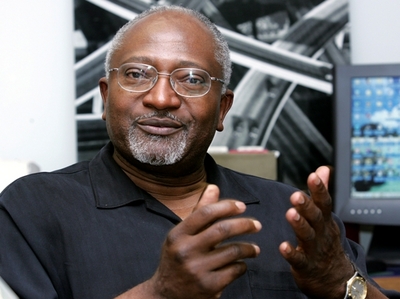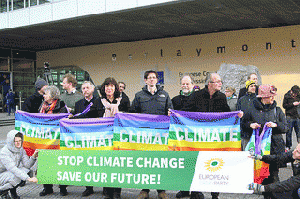Much attention in recent years has been devoted to green energy and reducing the human carbon footprint to counter the global warming and climate change threat. The shift to renewable energy is the preferred strategy for a clean energy future. However, a form of energy apartheid exists in the U.S. which disproportionately impacts African Americans and other people of color. African Americans are thirteen percent of the U.S. population and on average emit nearly twenty percent less greenhouse gases than non-Hispanic whites per capita. According to a 2002 Black Leadership Forum report, 68% of African Americans live within 30 miles of a power plant--the distance within which the maximum effects of the smokestack plumes are expected to occur, compared with 56% of whites and 39% of Latinos.
The campaign to make clean energy available to all communities is clearly an environmental justice and climate justice issue. Climate change amplifies existing inequalities--especially inequality that has left African Americans behind. A number of coalition groups such as the Environmental Justice Leadership Forum on Climate Change and others have called on President Obama to "close the environmental justice gap" in his climate action plan. In reality, climate policies that best serve African Americans and other disproportionately affected populations also best serve global economic and environmental justice. Numerous studies document the disproportionate and unequal burden of climate change and the differential application of climate policies on African American communities. Too often some communities still have the "wrong complexion for protection" when disasters strike, including climate-related disasters.
A distinctive African American voice is critical for advancing just energy policies. The nation's historically black colleges and universities (HBCU) have a special role to play in producing new leadership and new voices in advancing climate justice and just energy policies. Jacqui Patterson, who directs the NAACP Environmental Justice Climate Program, is one of those voices. She will be the 2014 Black History Month featured speaker at the Barbara Jordan-Mickey Leland School of Public Affairs at Texas Southern University in Houston on Thursday February 27, 6:30pm. (114 McCoy Auditorium, Public Affairs Building). Ms. Patterson's leadership has advanced climate justice principles in the nation's oldest civil rights organization.
Ms. Patterson is the co-author of the 2012 NAACP report, Coal Blooded: Putting Profits Before People, a report analyzing sulfur dioxide (SO2) and Nitrogen Oxide (NOx) emissions in conjunction with demographic factors--race, income, and population density--to rank the environmental justice performance of the nation's 378 coal fired power plants. Two million people live within three miles of one of the top twelve "dirtiest" (dirty dozen) coal fired power plants; 76 percent of these residents are people of color compared to only 37 percent people of color in the U.S. population in 2012. The average per capita income for communities hosting the dirty power plants was only $14,626, compared with the national average of $21,587.
Ms. Patterson latest report from the NAACP, Just Energy Policies: Reducing Pollution and Creating Jobs, evaluates energy policy in all 50 states from a civil rights perspective. The 556-page report lays out a vision, supported by practical data, for a transition from harmful energy production processes in our communities to an energy efficient and clean energy policy landscape that reduces pollution and creates new jobs. It found African Americans, Latinos, Native Americans and low-income Americans tend to most often face potential health threats caused by the environment and facilities in their neighborhoods, tend to spend the largest share of their incomes on energy, but are underrepresented in the energy industry workforce. In 2009, African Americans spent $41 billion on energy, but received only held 1.1% of energy jobs and only gained .01% of the revenue from the energy sector profits.
African Americans' quest
for just energy and climate policies is about environmental
justice, economic justice and civil rights.
And it's the right thing to do.






